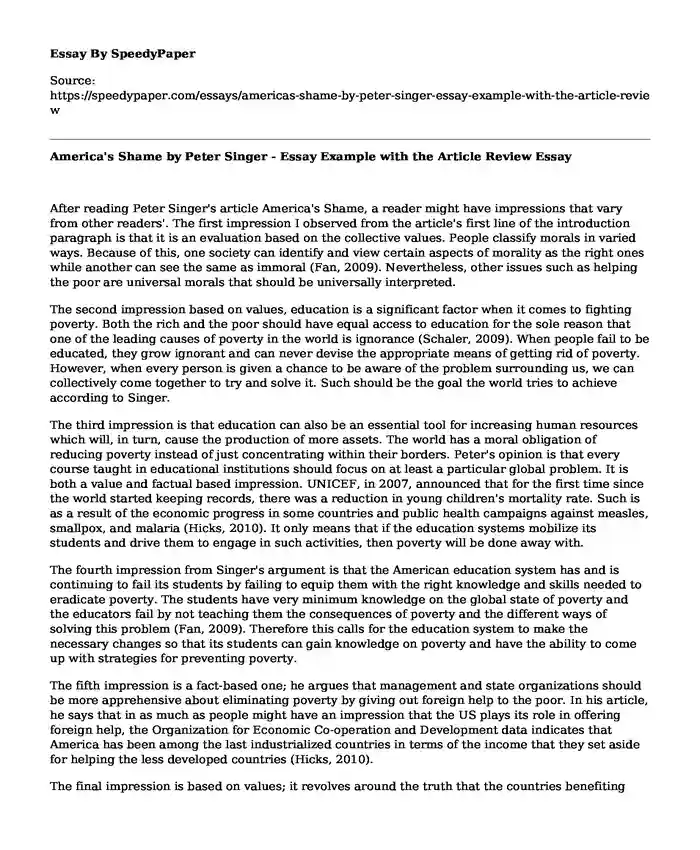
| Type of paper: | Essay |
| Categories: | Education United States |
| Pages: | 3 |
| Wordcount: | 693 words |
After reading Peter Singer's article America's Shame, a reader might have impressions that vary from other readers'. The first impression I observed from the article's first line of the introduction paragraph is that it is an evaluation based on the collective values. People classify morals in varied ways. Because of this, one society can identify and view certain aspects of morality as the right ones while another can see the same as immoral (Fan, 2009). Nevertheless, other issues such as helping the poor are universal morals that should be universally interpreted.
The second impression based on values, education is a significant factor when it comes to fighting poverty. Both the rich and the poor should have equal access to education for the sole reason that one of the leading causes of poverty in the world is ignorance (Schaler, 2009). When people fail to be educated, they grow ignorant and can never devise the appropriate means of getting rid of poverty. However, when every person is given a chance to be aware of the problem surrounding us, we can collectively come together to try and solve it. Such should be the goal the world tries to achieve according to Singer.
The third impression is that education can also be an essential tool for increasing human resources which will, in turn, cause the production of more assets. The world has a moral obligation of reducing poverty instead of just concentrating within their borders. Peter's opinion is that every course taught in educational institutions should focus on at least a particular global problem. It is both a value and factual based impression. UNICEF, in 2007, announced that for the first time since the world started keeping records, there was a reduction in young children's mortality rate. Such is as a result of the economic progress in some countries and public health campaigns against measles, smallpox, and malaria (Hicks, 2010). It only means that if the education systems mobilize its students and drive them to engage in such activities, then poverty will be done away with.
The fourth impression from Singer's argument is that the American education system has and is continuing to fail its students by failing to equip them with the right knowledge and skills needed to eradicate poverty. The students have very minimum knowledge on the global state of poverty and the educators fail by not teaching them the consequences of poverty and the different ways of solving this problem (Fan, 2009). Therefore this calls for the education system to make the necessary changes so that its students can gain knowledge on poverty and have the ability to come up with strategies for preventing poverty.
The fifth impression is a fact-based one; he argues that management and state organizations should be more apprehensive about eliminating poverty by giving out foreign help to the poor. In his article, he says that in as much as people might have an impression that the US plays its role in offering foreign help, the Organization for Economic Co-operation and Development data indicates that America has been among the last industrialized countries in terms of the income that they set aside for helping the less developed countries (Hicks, 2010).
The final impression is based on values; it revolves around the truth that the countries benefiting most from official aid are those in the Middle East. This is because of war and terrors experienced there. Singer says people have a misguided conviction that a nation like the United States offers most aid that is a fraction of state expenditure when in truth the sum of Government expenditure which is directed to aid is only a percentage (Schaler, 2009). He says most of United States aid is not actually for helping the extremely poor but rather, approximately a quarter of that relief is what is directed to those countries that the OECD has classified as the least developed ones.
References
Fan, W. (2009). Ethical problems in connection with world poverty. Lingnan University, Hong Kong).
Hicks, D. A. (2010). Money enough: Everyday practices for living faithfully in the global economy. San Francisco, CA: Jossey-Bass.
Schaler, J. A. (2009). Peter Singer under fire: The moral iconoclast faces his critics. Chicago: Open Court.
Cite this page
America's Shame by Peter Singer - Essay Example with the Article Review. (2022, Jun 16). Retrieved from https://speedypaper.net/essays/americas-shame-by-peter-singer-essay-example-with-the-article-review
Request Removal
If you are the original author of this essay and no longer wish to have it published on the SpeedyPaper website, please click below to request its removal:
- Free Essay on Crime Scene Investigation Procedures
- Essay Sample on How Is Petroleum Formed
- Why Children Talk to Themselves - Free Essay Sample
- Nutrition Essay Sample: Marasmus Topic
- Essay Example on the Ohio Women's Bar Association Law
- Free Essay on How Deviant Behavior Is Sometimes Considered Acceptable or Even Encouraged
- Free Essay: Job Evaluation, Market Positioning, and Pay Systems
Popular categories




